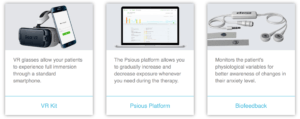Psious – Using VR exposure therapy to overcome fears & anxiety disorders

Psious is a behavioral health technology company. Founded in 2013, it provides a virtual reality platform – Psious Toolsuite – aimed at improving mental health treatment through SAAS offering.
European VR industry is getting traction in recent years, with an ecosystem of nearly 300 companies across different segments of VR, from device manufacturers, tools/platform players to content providers. While the research shows that gaming, like in the US, represents the most competitive space, increasing number of VR applications is becoming available across a variety of segments.
In the health care and fitness space, companies are utilizing VR for medical training, mental treatments and physical rehabilitation. Spain-based Psious, is a behavioral health technology company that provides SAAS offering targeting mental health professionals who want to use VR to improve therapy offered to their patients.
Value creation
An estimated 18% of the population suffer from anxiety related disorders, majority of which go untreated. Virtual reality is an effective solution to treat mental illness by helping patients imagine their deepest fears. Unfortunately, however, access to the technology and prohibitive costs have long been an obstacle for many clinicians. An effective solution therefore needed to remove the technology barrier and provide an affordable and easy-to-use service.
Psious is making the benefits of VR more easily available by taking advantage of mobile and ever decreasing costs of VR hardware (VR goggles). Company creates value through its Psious Toolsuite platform that consists of a virtual reality app and the control panel in the web platform. This platform is hardware agnostic and works with every type of equipment. In order to decrease barriers to adoption, Psious offers annual subscription packages that include hardware and assists its customers with the setup and technical support.
The platform allows clinicians to monitor in real time what the patient sees in the smartphone and personalize the treatment according to his or her need. The platform also contains a wide range of audiovisual resources such as hyper realistic virtual environments, augmented reality applications and 360 videos.
Currently, Psious offers environments for treating most common anxiety disorders by partnering with medical experts and creating its own content. Its platform also provides tools for mindfulness and relaxation exercises, which can help patients suffering from depression or other mental illnesses.
Value capture
In its early days, Psious business model relied on approaching patients directly and charging them subscription costs for using the platform and renting the hardware (VR googles). Company soon learned, however, that the average customer lacked awareness about VR, something that is not specific to European market and can be observed elsewhere across various VR applications. Given the difficulties of direct-to-consumer approach, Psious turned to the therapists instead and worked on selling the platform as a complementary tool that helps them improve the effectiveness of therapy and speed up the recovery process. It is selling the access to its platform on a subscription basis and also offers rental of VR hardware for patients’ use.
There is limited data available about company’s financials, but given the differences in medical care across geographies and a variety of payment structures, I’d predict that this approach calls for different pricing solutions and software / hardware bundles depending on the jurisdiction of use.
Future growth opportunities
At present, Psious develops all content in-house and utilizing cloud, updates its environments based on customer feedback and the latest research. This makes its solution more easily scalable and ready for upgrades. In-house content development also allows the company to control the quality and customer experience.
Downside of the in-house approach, however, is that it requires very specific expertise in domains of various mental health treatments and disorders. It therefore doesn’t tap into extensive knowledge and research conducted by researches worldwide and may as a result lack in the quality and effectiveness.
Having proved the concept of its solution and received acceptance in the market, I think Psious should think about opening the platform for third-party content creators, whether that’s in the form of partnerships or crowdsourcing end-to-end content production. Doing so, Psious has the potential to tap into extensive pool of knowledge and extend its offering to a greater range of mental health solutions, thus bridging the gap between content creators and the mental health professionals. Its platform can thereby through the network effects grow in size and solidify its leadership position in the market.
Sources:
[1] http://media.bemyapp.com/psious-makes-vr-mental-therapy-broadly-available/
[2] https://psious.com/
[3] https://vrjam.devpost.com/submissions/36248-psious-toolsuite
[4] http://voicesofvr.com/overcoming-fears-vr-exposure-therapy-psious/
[5] https://venturebeat.com/2017/02/07/europes-virtual-reality-sector-has-grown-to-nearly-300-companies/
[6] http://www.businesswire.com/news/home/20170207005665/en/Venture-Reality-Fund-Releases-European-Virtual-Reality







Nice post Katarina.
I was reading about VR in healthcare for my post too and am curious to understand what kind of content does Psious develop is it a game or an immersive experience in a random destination or something else?
In addition when going direct to customer did it face any sort of health regulation challenges that it had to overcome or are approvals not required in this case?
Such an interesting application! Thanks for writing about this.
This subject made me think about the ethical implications of VR/AR, both from a patient safety perspective as well as a data privacy perspective. This seems like it should be a tool that is used in combination with careful doctor oversight … I worry there are liabilities stemming from the possibility that vulnerable patients could misuse the technology, potentially worsening their conditions. And regarding data privacy, I would want to feel confident if I were a user that my personal data was being sufficiently protected. I would worry that a technology company doesn’t have to adhere to the same data regulations as those in the healthcare field do. And given that mental illness / depression is still somewhat taboo in society (even though it shouldn’t be!) I suspect a number of users would feel similarly wary of privacy protections.